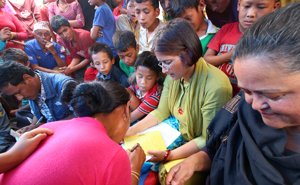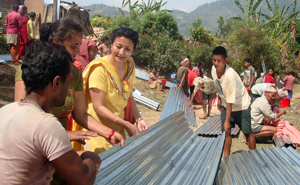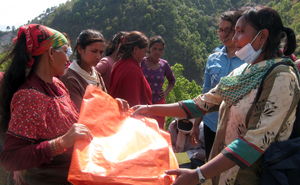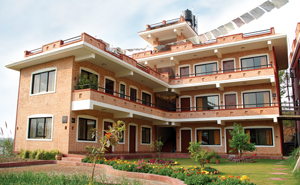


Nepal was in the midst of finalizing the draft constitution when the 7.8 Richter scale earthquake with its epicenter in Barpak/Gorkha, hit Nepal on 25th April 2015. The second big one, a 7.3 Richter scale earthquake on 12th May with its epicenter in Dolakha, Sindhupalchowk and the many aftershocks, took almost 9000 lives (above 55% women), injured above 22,000 people, and over 500,000 homes are rendered unusable. World heritage sites, most of the schools, hospitals, and official infrastructures in the affected districts are also unsafe for use. So far almost 400 aftershocks of above 4 Richter scale has not fully allowed lives to return to normalcy. The agility and speed, with which Nepali youths, organizations, and the world community responded to save, salvage, and support has been remarkable. Likewise the resilience, stoic attitude, and self-help of the Nepalis deserve accolades.
From the 4th day after the 1st earthquake, Tewa and Nagarik Aawaz (NA) (www.nagarikaawaz.org.np) with a cumulative work experience of over 35 years, in the area of women's empowerment & philanthropy; and peace building respectively began their joint relief work. We decided to work jointly and have a joint Earthquake Relief Fund (ERF). We began by using the funds we had, and luckily funds began to pour into the ERF with trust and speed. Early on it was agreed that an ERF Committee would be put in place with three external members for making major decisions and for transparency. Besides an internal "code of conduct" policy was put in place to guide the relief approach.
Moving Relief on the Ground
During the initial 70 days of intense relief operations Tewa/NA reached 120 communities in 15 affected districts. In over 90% of these outreaches, this according to them was the first relief support that the community people had received. Tewa/NA distributed cash unless it was requested otherwise. Some of the requests specifically came for food, tarpaulins or corrugated sheets. All the relief outreach ensured the special needs of special interest groups e.g. women, elderly, children, differently abled, excluded groups, pregnant or lactating mothers. During the relief outreach covering 116 communities in 15 districts, Tewa/NA gave off a little over US$ 500,000 within the first 60 days. In doing this some 25,000 households were reached and some 7000 postnatal/pregnant women, elderly and children were supported directly. Besides Tewa/NA reached out to 46 grantees and NA Sahakarya Shantiko partners (some 31 others said they had enough support since others had reached out to them) in the affected districts who needed relief support. Noteworthy in these initiatives, is the amount of about US$ 2000 gifted back to us by the affected community people who received our support. But more important than the amount, is the very important outcome that even in the worst of disasters, the survivors are eager to practice philanthropy by contributing for larger good. This has been one of the most profound learning.
Beyond our own limitations, Tewa/NA also worked through partners whose outreach was beyond our capacity or expertise e.g. Nepal Share for helicopter drops to the most remote locations; supporting hospitals so they could manage and cope with the overflow of patients after the disaster; other trusted partners through whom we could expand our coverage.
Some of the other achievements are as follows:
- The piloting of the two recovery and rehabilitation initiatives, "Hamro Tewa Gaon-Gharma" led by Tewa & "Building Lives – Inspiring Hopes" led by Nagarik Aawaz
- Supporting our heritage - Bhaktapur
- Both organizations now have an experience and learning of doing very sensitive, peaceful, low cost and swift relief work with no additional overheads
- The sense of volunteerism among staff, board, volunteers and some donors has been outstanding – it is now available to be tapped into
- The two organizations learnt to work together combining their skills/experience in times of desperation & urgent need to built strength and synergy. This also means the infusion of peace work into grantee organizations.
- Engaging other stakeholders and organizations of trust to ensure that work coverage was expanded and deeper
Learning
We have learnt that in a relief operation, it is most important to move swiftly. If support reaches early it will not only fulfill basic human needs of the survivors, but also contribute to emotional well-being providing confidence and courage to overcome the loss, grief and trauma.
It is very important to remember that the affected people are like us. They have lost their loved ones, homes, and belongings. Their human pain and tragedy is so big that even those of us here in Nepal, who have our families and homes intact cannot fathom. The least we can do is to be respectful and ensure that their dignity is not crippled that nothing that we do reduces them to be mere "victims". It was inspiring to note how appreciative, patient, caring and gifting they all were – how can we treat them as "victims"!
We as Tewa/NA were gifted an opportunity to support, learn, and empathize. We learnt that a reflective personal journey was essential. We learnt that work on the outside for others demanded deep introspection from each one of us thus engaged.
In a situation such as this, especially at the initial stage, emotions run high and there is no time to lose to listen – we need to prepare in advance stepping into the shoes of those we intend serving. Leveling with an equitable approach, calming with compassion, acting in their best interest/s, and gaining the community's confidence and trust is our duty. Monies and things are essential, but they could mean little without all of the above.
When monies come to us as conduits with trust, it is our duty to ensure that all of it goes into the hands of the survivors – in our overhead costs.
We know that today our world is interdependent, and more than ever before, people are exposed, "educated" and connected. They know what needs doing and how. "Trust" and "control" don’t work together – but without trust there can be no real work. We learnt that monies, was of less real long-term value, than giving of services with love. All the communities we went to appreciate our approach the most. At different levels in both the organizations it was proven that leadership is not about perceived power but about service and responsibility. It was proven that fear, selfishness and greed wouldn't go – but LOVE did, and lasted too – attested by all our follow-up activities.
We learnt that good intentions, coupled with the right approach and a clear modus operandi helped all of us to work with cohesion and great speed. The end result was all good – without a single mishap!
Challenges
Some of the challenges encountered by the Tewa/NA teams were as follows:
- Both organizations had no experience of doing relief work
- Limited human resource and funds at the beginning (until volunteers were mobilized & funds flowed in)
- Communications, roads and transportation constraints existed owing to unsafe and high risks (owing to landslides) roads and locations
- Unclear & confusing official directives were issued which made it harder
- Official insensitivities to gender and diversity
- Probable interference from political cadres
- Probable risks of looting/theft by robbers since the homes were completely destroyed in some places
- Security & human rights threats at the level of the affected communities (trafficking, VAW, land issues
- This is a time for the weakening of women's agency – therefore early support is essential both at the individual and the organizational level
- Chances of increasing internal/disaster related conflicts owing to the presence and lack of coordination among aid workers (e.g. distribution of inconsistent labor rates)
- Loss of trained staff owing to rapid recruitments of aid agencies
- Uncertainty of long-term work from aid agencies therefore risks for safe landings of development initiatives, or creation of discontentment and disharmony at subtle and multiple levels
Tewa Philanthropy
Tewa Grantmaking
Tewa Volunteers
Tewa Children
Tewa Post Earthquake Relief & Recovery
Tewa Model Adaptation Initiative


